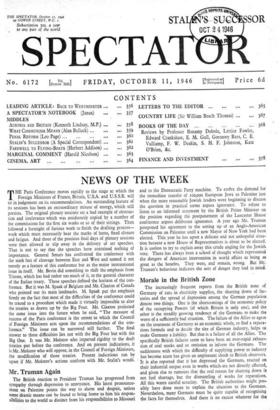NEWS OF THE WEEK
THE Paris Conference moves rapidly to the stage at which the Foreign Ministers of France, Britain, U.S.A. and U.S.S.R. will sit in judgement on its recommendations. An outstanding feature of its sessions has been an extraordinary misuse of energy, which still persists. The original plenary sessions set a bad example of obstruc- tion and irrelevance which was assiduously copied by a number of the commissions for the first six weeks or so of their sittings. Then followed a fortnight of furious work to finish the drafting process— work which must necessarily bear the marks of haste, fixed closure and fatigue. And three of the precious final days of plenary sessions were then allowed to slip away in the delivery of set speeches. That is not to say that the speeches have contained nothing of importance. General Smuts has confronted the conference with the stark fact of cleavage between East and West and named it not merely as a feature of this conference but as the major international issue in itself. Mr. Bevin did something to shift the emphasis from Trieste, which has had rather too much of it, to the general character of the Italian treaty. These speeches defined the horizon of the con- ference. But it was M. Spaak of Belgium and Mr. Claxton of Canada who pointed out its main landmarks. M. Spaak put the emphasis firmly on the fact that most of the difficulties of the conference could be traced to a procedure which made it virtually impossible to alter the treaties as drawn up by the Big Four. Mr. Claxton projected the same issue into the future when he said, "The measure of success of the Paris conference is the extent to which the Council of Foreign Ministers acts upon the recommendations of the con- ference." The issue can be narrowed still further. The final answer to these difficulties lies not with the Big Four but with the Big One. It was Mr. Molotov who imparted rigidity to the draft treaties put before the conference. And on present indications, it is Mr. Molotov who will oppose, in the Council of Foreign Ministers, the modification of those treaties. Present indications can be Upset if Mr. Molotov's actions conform with Mr. Stalin's words.






























